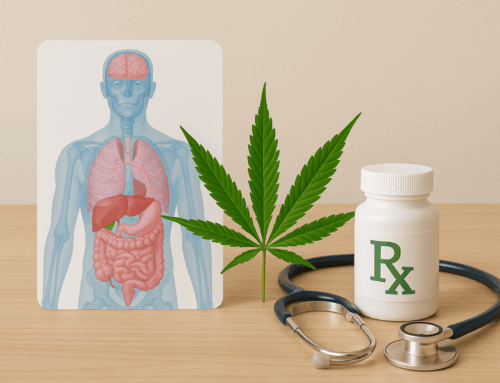Diabetes is one of the most common chronic diseases today. Keeping diabetes in check means you’ve got to keep your blood sugar steady, get to a healthy weight, and deal with issues like inflammation and nerve damage. Most patients these days are interested in natural intervention methods, which is leading to further research into medical cannabis for diabetes. Can diabetes medicine and cannabis be integrated into everyday practices? In this article, we will learn how medical cannabis can help with diabetes.
What Is Diabetes?
Diabetes mellitus is one of the most prevalent health challenges around the world. It concerns how the body utilizes food and generates energy. A surplus of the food that we consume is ultimately converted into glucose. Pastries and sugary foods increase blood sugar levels, and the pancreas has to contract to produce insulin. Insulin helps cells to absorb sugar easily, and the resulting energy is a boon. If you are living with diabetes, this cycle might not work as smoothly.
Diabetes is primarily categorized into three types:
- Type 1 Diabetes –This is a lifelong health problem where the immune system attacks the pancreas, which is the part of the body that makes insulin. Insulin helps control blood sugar. When the pancreas can’t make enough insulin, people must give themselves insulin shots to keep their blood sugar at the right level.
- Gestational Diabetes- This type of diabetes shows up during pregnancy and usually goes away after the baby is born. However, it can raise the chances of developing Type 2 diabetes down the road. Taking care of your health with a good diet and regular exercise helps after giving birth.
- Type 2 Diabetes – When someone has type 2 diabetes, their body either doesn’t make enough insulin or can’t use what it does produce effectively. People with this condition can get sick more often. This usually happens because they do not eat healthy food and don’t exercise enough.
Diabetes commonly causes frequent urination, excessive thirst, fatigue, blurred vision, and unexplained weight loss. If it’s not taken care of, it can cause some major problems like heart issues, kidney failure, nerve damage, vision loss, and even the need for amputations, which can mess with someone’s quality of life.
Capable Treatments for and Their Drawbacks
Patients diagnosed with diabetes type one and type 2 diabetes are generally recommended to change their lifestyle, use drugs, and be subjected to insulin therapy. People with diabetes are encouraged to eat healthy, well-balanced meals, exercise frequently, and monitor their blood sugar regularly. Oftentimes, metformin is prescribed to increase insulin sensitivity alongside other drugs that increase insulin secretion or decrease glucose absorption.
Conventional treatments have a broad range of unique obstacles, including but not limited to:
- Side effects: Certain drugs are bound to cause adverse effects such as nausea, vomiting, diarrhea, low blood sugar, and, in some cases, increased appetite.
- Costs: Other medications, such as insulin, are known to be relatively pricey alongside other treatments for diabetes.
- Adherence burnout: Treatment is usually very rigid and can be very draining, both physically and psychologically. Standard treatments may not relieve even at a chronic level with inflammation or arthritis. It is mainly due to the reasons above that many other patients and researchers have turned to alternative therapies such as medical cannabis.
Understanding How Medical Cannabis Functions in the Body
Medical cannabis has compounds that are cannabinoids; the most common are THC (tetrahydrocannabinol) and CBD (cannabidiol). These compounds work with the body’s Endocannabinoid System (ECS), which governs fundamental processes like mood, appetite, inflammation, pain, and immune response.
The ECS maintains balance within the body, or homeostasis. Along with the endocannabinoid system, cannabinoids may help restore balance to several systems that are disrupted in diabetic patients.
Medical Cannabis for Diabetes Patients
Medical cannabis doesn’t have any specific treatment for diabetes. Still, some studies mention that the cannabinoid compounds may alleviate some of the symptoms and complications associated with the illness.
Benefits for Diabetes: Some early studies suggest that cannabis might change how the body uses sugar. One study found that people who use cannabis have lower insulin levels and smaller waist sizes than those who don’t use it. This might mean they handle sugar better. Some research says that a specific part of cannabis called CBD could help lower blood sugar and inflammation in the pancreas. However, there aren’t many studies on people yet, and the results can be confusing.
Appetite Control and Weight Management: Staying at a healthy weight is very important for people with diabetes. It helps not to eat too much food. THC can make people hungry, but some studies say that people who use cannabis a lot might weigh less than those who don’t. This could be because CBD might help them eat less.
Anti-Inflammatory Effects: Chronic low-grade inflammation can lead to Type 2 Diabetes and other health issues. Studies show that THC and CBD can help reduce inflammation. Medical cannabis might help reduce this inflammation and protect important organs like the liver and pancreas. It can also help strengthen the immune system, often weak in people with diabetes.
Nerve Pain Relief: Diabetes can cause a painful problem called diabetic neuropathy, which affects the legs and feet. A person feels pain, tingling, or numbness. In Canada, some treatments can help with this pain. Breathing in cannabis may help people feel better, and there are also creams and oils made from CBD that can relieve pain without getting you high.
Precautions and Side Effects of Cannabis
As with any form of treatment, medicinal cannabis has its risks. Things to keep in mind include:
Psychoactive Effects: Tetrahydrocannabinol (THC) can cause lightheadedness, dry mouth, dehydration, mood changes, and short-term memory loss.
Drug Interactions: Cannabis may interact with certain antidepressants, blood thinners, and some diabetes medications.
Dosage: Finding the correct dosage can be difficult. Taking too much THC may increase anxiety or confusion, especially in older adults.
Method of Delivery: Non-smokable forms, like tinctures, capsules, or edibles, are generally safer than smokable forms, which can irritate the lungs.
Always talk to your doctor before adding cannabis to your diabetes management plan.
Consulting with Healthcare Providers
Always discuss with a medical professional, preferably one that practices cannabinoid therapy, to receive guidance before taking cannabis for medical use. They can:
Go over your current medications.
Advise on appropriate dosages as well as types of the products—whether CBD only or CBD blended with THC.
Track side effects and impacts.
Revise your diabetes treatment plan. Proven diabetes treatments should be supplemented with cannabis products, not replaced.
The Possibilities of Cannabis in Treating Diabetes
As more research is conducted and medical cannabis gains legal recognition, the support for or opposition to the claims regarding its effects on chronic illnesses is likely to become clearer.
The niche of focus may include:
- Creating specific standardized formulations of cannabis for diabetes.
- Studying the effectiveness and safety over a long time.
- Studying the impact on other diabetes care medications.
- Creating specific cannabinoid profiles for different types of diabetes symptoms.
As more hypotheses get tested, cannabis-based therapies might be considered for diabetes management, especially for the treatment-resistant patients.
Conclusion
Using cannabis isn’t a cure for diabetes. Still, it might help with inflammation, pain, blood sugar levels, and weight management. Much of the research is still in the air, so we need more studies. Suppose you’re thinking about trying medical cannabis. In that case, it’s a good idea to talk to your medical marijuana doctor first to ensure it fits into your treatment plan safely.
FAQs
Is weed legal in Kentucky for managing diabetes symptoms?
As of now, weed is legal in Kentucky only for medical use, and you need approval from a medical marijuana doctor. Patients with chronic conditions like diabetes may qualify if cannabis can help manage related symptoms like inflammation or nerve pain.
Can Delta-9 THC help with diabetes-related complications?
Delta-9 THC may help reduce pain and inflammation, which are common in diabetes. However, it also has psychoactive effects, so it's important to consult a doctor before using THC products as part of your diabetes care.
What are the health benefits of cannabis for people with diabetes?
Some health benefits of cannabis for diabetic patients may include reduced inflammation, pain relief, better appetite control, and possible improvements in insulin sensitivity. Research is still growing, so effects may vary.
Is medical cannabis effective for chronic pain caused by diabetes?
Yes, medical cannabis for chronic pain like diabetic neuropathy (nerve damage in the legs or feet) has shown promising results. Products like CBD oils or topical creams can help ease pain without strong side effects.
Can medical cannabis help with skin issues like psoriasis in diabetic patients?
Yes, some diabetic patients also suffer from skin conditions. Medical cannabis for psoriasis may help reduce inflammation and itching. CBD-based creams or balms can be useful, but always talk to your doctor before use.





